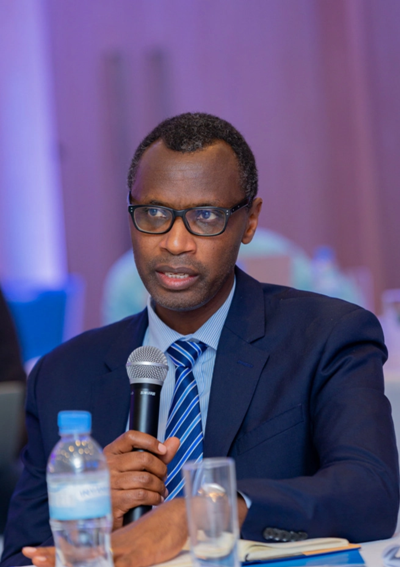The UR-Sweden Programme has been hailed by the ministry of education for contributing to Rwanda’s socio-economic transformation over the past 20 years and the next five years through promoting research and PhD studies. The Program contributes to the development of Rwanda and poverty eradication through research support to the University of Rwanda. It is the largest and most comprehensive externally funded Institutional Program at the University of Rwanda.
Participants during the meeting
While officially opening the annual review meeting of the UR-Sweden Programme on Tuesday May 17, the Minister of Education ,Valentine Uwamariya underlined the research impact being developed towards Rwanda socio-economic transformation by strengthening local PhD programme.
The five-day meeting-which brought together team leaders of research and support subprograms from university of Rwanda and partner universities in Sweden-aims to define and discuss implementation of the programme activities that will mark the year 2022-2023.
The project aims to build capacity among academic researchers at university of Rwanda. Up to date the partnership has around 85 PhDs holders of whom 29 are female that graduated from this programme.
Remarks by Hon. Minister of Education
“ We want to strengthen the local PhD programme so that we achieve the targets we have in the agreement. We are discussing how we can strengthen the research capacity to have a good number of PhDs graduates but also how their research findings are impacting the socio-economic transformation of the country,” Minister said.
Johanna Teague, the Ambassador of Sweden to Rwanda noted that the partnership looks to ensure that built research capacity can be used in the development of Rwanda by allowing policy makers and entrepreneurs to have access to knowledge and be able to make informed decisions.
H.E Johanna Teague, the Ambassador of Sweden to Rwanda was also present
“We are strengthening higher education for impact through strengthening local PhD Programme. We will continue to strengthen research for impact for the development of the country,” she said.
Strengthening local PhD programme is part of a 5-year cooperation deal to boost research and professional skills development.
Papias Malimba Musafiri, the Deputy-Vice Chancellor for Strategic Planning and Institutional Advancement at University of Rwanda said that the first phase of the UR-Sweden programme looked at strengthening the Master’s programme as lecturers could be sent to Sweden for Master’s degrees.
In the second phase, the Master’s programme candidates were locally trained by Sweden universities.
In the third phase, most of the lecturers went for PhD programme in Sweden while in the fourth phase, the PhD candidates will be trained locally at University of Rwanda by Sweden universities experts.
“Strengthening local PhD programme will save cost. The cost that could be spent on one PhD candidate in Sweden can now be spent to train five people locally. This will help us to increase the number of PhDs holders,” he explained.
He said that the activities planned in the year 2022-2023, under the five-year programme, include admitting new candidates for PhD level and post-doctorate studies.
The five-year phase, which is 4th phase, is expected to train 80 PhD candidates compared to 52 PhD that were enrolled during the previous phase 2013-2018. They will be trained both at UR and in Swedish varsities on Sandwich mode.
Apart from PhD training, master’s programmes will also be supported in collaboration with 14 Swedish partner universities. At least 26 postdocs, and more than 240 Masters Students will also be trained. This is done through competition and open for all university of Rwanda lecturers. The activities also include establishing ICT-based infrastructure to boost education among other priorities.
We are also looking for research and innovation activities for students by providing grants,” he added.

Dr Papias Malimba, the Deputy Vice Chancellor for Strategic Planning and Institutional Advancement
The University of Rwanda was, in 2019, granted Rwf31,5 billion by the Government of Sweden to boost research and use of scientific knowledge in Rwanda under the existing UR-Sweden Programme.This is expected to build capacity for UR to deliver on the Rwanda National Development Agenda.
The 4th phase will equally support ICT infrastructure, which will integrate research, students, administration and finance in order to alleviate university services and make sure that research can be conducted in a relatively conducive environment.
The current phase includes 14 research training programmes and five research support programmes.
Expected impact
Although the higher education sector in Rwanda has grown significantly in terms of number of students, programs, and institutions during recent years, there is still a lack of qualified staff that can conduct research, engage with policy makers, and offer students in Rwanda high quality postgraduate education.
Sweden’s research collaboration with Rwanda addresses exactly this and we see the Program, which is the largest in the higher education sector, as a pillar in Rwanda’s efforts to make the transition to a knowledge-based economy.
The five-year activities aim to increase production and use of scientific knowledge of international quality that contributes to Rwanda’s development.
It is aimed to contribute to the establishment of an environment more conducive to research and postgraduate training at the University of Rwanda, increase the number of PhD and Masters Holders in Rwanda, increase the quantity and quality of research conducted at the University of Rwanda.
It also looks at increasing the use of research and competences produced within the Programme, in political decision and policymaking in Rwanda as well as the use of research and competences produced within the Programme, by the Rwandan society at large.
The story contains some excerpts from article published in the New Times. You can read the original story here